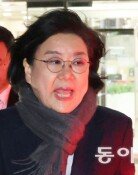Ruling party returns to favoritism toward Yeongnam region
Ruling party returns to favoritism toward Yeongnam region
Posted October. 19, 2023 08:32,
Updated October. 19, 2023 08:32
"What we party members want from the party reinventing itself is, honestly speaking, to be nominated for the general elections,” said a member of the ruling People Power Party in the capital area following the miserable defeat in the by-election in Gangseo District, Seoul last Wednesday. Considering his comments on how the ruling party's members have since responded, they only pretended to be vociferous about turning a new leaf but lost momentum just in a week, which will invite greater trouble.
The next day after the crushing by-election defeat with a gap of 17.15 percentage points, the ruling party, seemingly perplexed, said with a sense of urgency, “Moderates turned their back on us,” desperately arguing that reinventing itself is the only way to get through. Presumably, it was reminded of the nightmare that it had in the 21st general elections three years ago when the party’s candidates in Gangseo's Gap, Eul, and Byeong districts were behind their DP competitors by a similar gap (17.88 percentage points) to that of the recent by-election. As it became obvious that they were losing ground in the Seoul metropolitan area, which the party had previously dismissed as an absurd observation, party members started blaming Chairman Kim Gi-hyeon's leadership for the loss of the by-election. However, Kim simply pledged to exert himself to reinvent the party without making any apologetic comments or showing responsibility.
Last Friday, two days after the by-election ended up with a defeat, President Yoon Suk Yeol made the first remarks on the election results. "It matters to bring about change calmly and wisely,” the president said. An insider of the presidential office implied that it is not the right choice to launch an emergency planning committee. To be sure, Chairman Kim is to blame for breaking the principle of excluding candidates with any liabilities from the nomination list. However, the presidential office did not even make any comments on President Yoon's decision to give amnesty to Kim Tae-woo who caused the by-election to happen. "It is just like an emperor giving the thumbs up to a gladiator who lost in a battle that he himself started and implying that he will be let alive,” a source familiar with the ruling party said.
Not until last Saturday, three days after the painful loss of the election, did the party respond to the "guideline” comment made by the presidential office. A total of eight nominative party officials including PPP Secretary General Lee Chul-gyu who is close to President Yoon, stepped down on Saturday morning while Chairman Kim and elective supreme council members maintained their posts. A meeting with 90 out of 111 party members present was held for four and a half hours on Sunday afternoon behind closed doors. However, the party stuck to the presidential office's advice. Thirty members or so addressed the party in the meeting but only a few called upon the chairman to leave office. The meeting concluded that the Kim-led party system will be kept intact.
On Sunday, Rep. Lee Man-hee, who was elected twice in the region of Daegu and North Gyeongsang Province, was nominated as the party's secretary general. In other words, the person who served as a key aide to President Yoon during his presidential campaign was selected to take charge of nominating party candidates in the next year's general elections. Although the decision reverted the chairman's promise to prioritize those based in the capital area and Chungcheong Province at the forefront just one day later, party members who publicly vetoed Chairman Kim's leadership in the meeting presumably chose to keep silent. Unlike all the firm requests heard from the meeting that the party should redefine its relationship with the presidential office, no one has come forward to lodge a complaint with party leadership. Apparently, they avoid raising their voice publicly.
Within the ruling party, 70 percent of candidates for the general elections are those based in the Yeongnam region with the chances of effortlessly winning once nominated by the party; and the remaining 30 percent are those from the rest of the country who will inevitably have to fight their way through the race from primaries to finals. Having said that, it is a pathetic scene that members of the ruling party are walking on eggshells around the presidential office not to get on its wrong side, explicitly wanting to be nominated for the general elections – even if they find themselves in the way of the party reinventing itself. In next year's general elections, the ruling party, which is supposed to be in charge of governance, will see the consequences of giving up winning over the hearts of moderates in the Seoul metropolitan area and leaning toward the Yeongnam region.





![“한동훈, 정치생명 걸고 무소속 출마해 평가받는 것 고려할만”[정치를 부탁해]](https://dimg.donga.com/c/138/175/90/1/wps/NEWS/IMAGE/2026/01/19/133186982.1.jpg)

